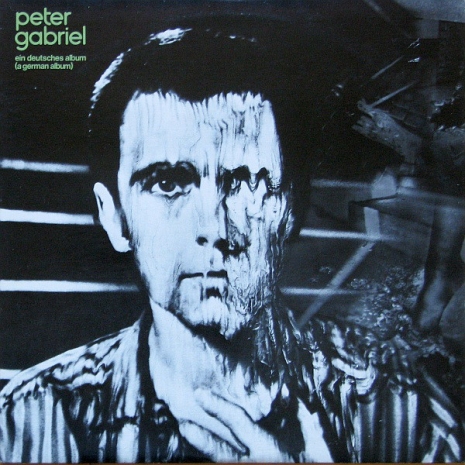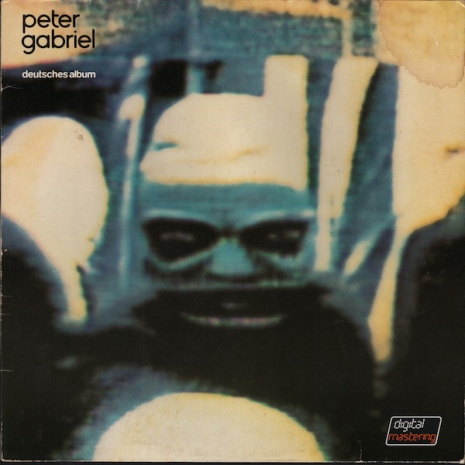
After his years in Genesis, Peter Gabriel released four solo albums, all of them confusingly given the title “Peter Gabriel,” that are widely recognized as post-prog/post-punk masterpieces of some stripe.
What many of his fans don’t know is that Gabriel made the decision to release German-language versions of the last two albums in that series, the ones often called “Melt” and “Security,” respectively. For Melt, Gabriel “merely” sang the translated German lyrics over the original tracks, but for the German version of Security it seems that he actually re-recorded large chunks of the album as well.
Such multilingualism among top recording acts is not unknown, of course. The Beatles, after all, released “Sie Liebt Dich,” a German version of “She Loves You,” and Petula Clark and Sandie Shaw had all kinds of hits on the continent. David Bowie released “Helden,” a German version of “Heroes.” David Lee Roth put out Sonrisa Salvaje, a version of Eat ‘Em and Smile with Spanish vocal tracks. But it’s obviously not all that common.
The translations for the two Gabriel albums were were supplied by a certain Horst Königstein, a German writer and director for television and the theater. The record is largely silent on Gabriel’s motivations for undertaking this extra work—if you ask me, the most likely answer is perhaps “creative restlessness.” In Experiencing Peter Gabriel: A Listener’s Companion, Durrell Bowman mentions that in concerts around 1980, Gabriel was observed to sing a French version of a song from the 1950s (if not earlier) called “Me and My Teddy Bear.”
In his book Without Frontiers: The Life and Music of Peter Gabriel, Daryl Easlea provides the following bit of commentary:
Following the success of the German version of Melt that Gabriel made in 1980, he released a sister version of Security, titled as the previous release, Ein Deutsches Album. However, while the previous album had been merely Gabriel overdubbing his vocals into German, here he went the whole hog and re-recorded and remixed huge swathes of the album, including getting Peter Hammill back in to sing backing vocals in German. It was a great achievement to remix and re-record some of the work, with different effects and vocal lines. It demonstrated that this had been Gabriel’s masterwork to date in that he had exercised a level of control over the recording that he hadn’t been able to before, the building-up-from-the-ground approach suited him perfectly and would be the method he would use on all further recordings.
I’m sure Mr Easlea is correct that Security left as a residue increased feelings of confidence in Gabriel. However, I recently spent a solid chunk of time listening to the English and German versions of both Melt and Security, and one of the clearest takeaways from those hours is that Melt is the superior album. Security has its strengths, to be sure, but overall, it’s simply a more conventional piece of work—but of course it was just that sort of convention and relatable sentiment, not, ah, “creative restlessness,” that years later allowed a song like “In Your Eyes” to become such a smash. Gabriel may have been the creative spawn of Gargravarr most of the time, but his genius was such that, especially in the 1980s, he could really wallop the masses with a “Big Time” or whatever.

ein deutsches album
Linguistically speaking, there isn’t all that much to report in terms of alterations or interesting turns of phrase in Herr Königstein’s exemplary renderings. Most of the songs have fairly conventional verses and choruses, so all one has to do is translate them, which Königstein did. It’s only in the more adventurous material that you can spot Königstein being forced to scramble a bit and deviate from the original meaning a little.
For instance, there’s a significant change in one of the lines of “Intruder,” which on the foreign release can claim the marvelous German word “Eindringling.” Most of the lines are straightforwardly translated, but an exception can be spotted in the lyric “A sense of isolation, a sense of isolation inspires me.” Königstein casts the line as “Wir sind unter uns, ich lass mich erregen,” which is quite different. “Wir sind unter uns” means something like “we are among us” but the real meaning would be, “we’re alone, it’s just us.” “Ich lass mich erregen” means “I let myself become excited.”
The German version of this track is practically a love song!
Or look at “Games Without Frontiers,” which in German becomes “Spiel Ohne Grenzen.” Instead of “Adolf starts a bonfire,” it says in the German version specifically that he is burning books: “Adolf zündet Bücher an.” (Okay, okay, that was implied anyway.) The striking line “It’s a knockout” that pops up about halfway through is handled wonderfully in the translation—it’s rendered as “Bis zum knockout” (until a knockout), which makes it something more like a continuation of the previous line, which goes “piss auf die fratzen im dschungel” (piss on the little brats in the jungle—until there’s a knockout). There’s more continuity there than in the English version. In case you’re wondering, the German version does retain the French choral part “Jeux sans frontieres” sung by children [update: actually Kate Bush!].

deutsches album
“Shock the Monkey,” one of Gabriel’s biggest hits off of these two albums, is not particularly well served by its German counterpart, which is called “Schock den Affen.” For whatever reason the chorus doesn’t have quite the force of the English equivalent; the verses, however, come off somewhat better. Interestingly, in the part where he sings “Monkey! Monkey!” during an early bridge, the German has him singing not “Affen” but “offen,” which means “open.” But what that gets us is not so clear.
One song in which the expressive limitations of the German language are evident is the song “Kiss of Life,” which is translated as “Mundzumundbeatmung,” which when it is broken up as “Mund-zu-Mund-beatmung” will be recognizable to English speakers as “mouth-to-mouth resuscitation.”
There’s at least one translated song Gabriel recorded that did not come from these two albums. “Spiel Ohne Grenzen” was released as a single, and for the B-side, Gabriel for some reason plucked “Here Comes the Flood” off of his first album (”Car”) for “Jetzt Kommt Die Flut.”
Gabriel’s accent seems to have gotten a little better during the period, it’s better on Security. On the earlier song “Spiel Ohne Grenzen,” for instance, Gabriel’s pronunciation is fine but there can be no mistaking that he is not a native speaker of German. On the Security tracks, there are fewer howlers and he nails a few of the words quite impressively.
I’m strictly a language guy, so I’ll gracefully bow out of the dissection of the altered musical tracks used on the German version of Security (perhaps my colleague Ron Kretsch will take that subject up?).
Here are some of the German tracks, but there’s more where that came from on YouTube.
Eindringling (Intruder):
Spiel Ohne Grenzen (Games Without Frontiers):
Schock den Affen (Shock the Monkey):
Mundzumundbeatmung (Kiss of Life):
Jetzt Kommt Die Flut (Here Comes the Flood):
Keine Selbstkontrolle (No Self Control):
Und durch den Draht (And Through the Wire):
Nicht die Erde hat dich verschluckt (Wallflower):
Das Fischernetz (The Family and the Fishing Net):